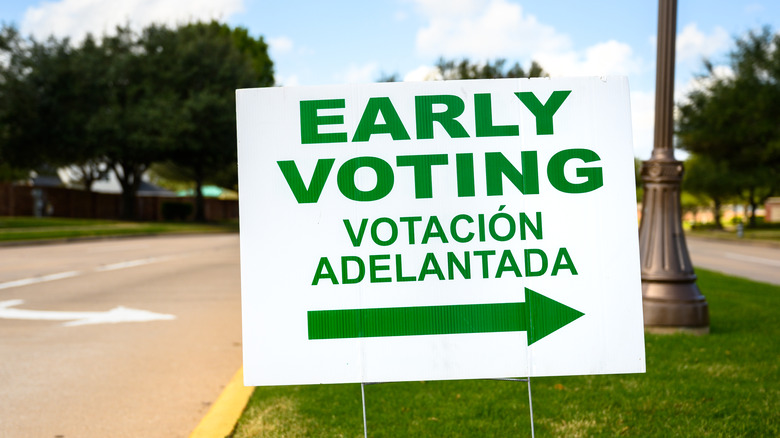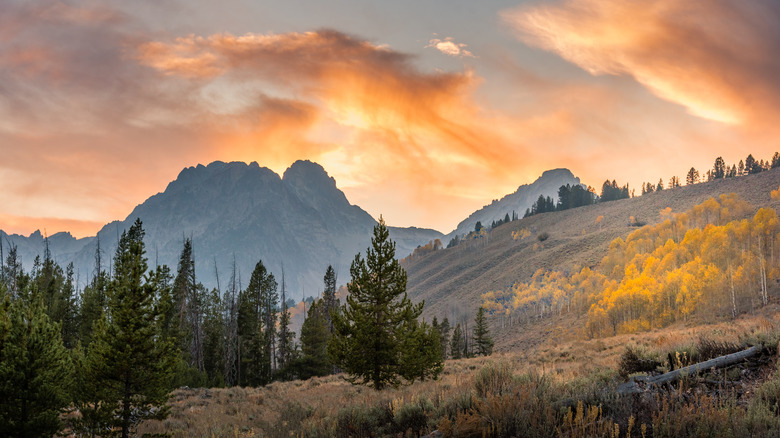Strict Regulations About Posting Yard Signs You Should Know About
There are a lot of funny, strange, and straight-up outdated laws out there. According to The Lawyer Portal, you can't hold or sell salmon if you have suspicions about it in England or Wales. This law is Section 32 of the Salmon Act 1986. If you receive fish and have the slightest feeling they are illegal, you can't dispose of them — you have to report the incident instead. If you fail to do so, you could spend up to two years in prison! In addition, it was illegal to change a lightbulb if you were not a licensed electrician in the Australian state of Victoria until a 1998 update to the Electricity Safety Act. The local government claimed the rules were to promote safety and reduce accidents.
There are also strange laws in the USA, and regulations can vary between states. This fact is especially true when placing signs in your yard, as each state has unique rules about what is okay and what isn't. It's essential to stay on top of property information and know what signs you can legally place around your home. You probably don't want to unknowingly break the law in your state and end up with a fine or worse. We've rounded up a few of the most strict and interesting rules across the nation.
Distributing yard signs without disclaimers is a misdemeanor in Indiana
In Indiana, a few things should be made abundantly clear about each political yard sign if it's going to remain legal. According to the Indiana Election Division, the sign should clearly show who paid for it and whether or not the candidate approved the messaging. The state refers to this information as the required disclaimer. If you create and distribute any signs that do not carry the disclaimer, you have committed a Class A misdemeanor.
The consequence for this is anywhere from a fine up to $5,000, one year in jail, or both! In addition to the $5,000 criminal fine, the state will also levy a $1,000 civil fine in some cases. This fine could happen if the information needed for the disclaimer is present, but it isn't clear. So, if you want to make or display political yard signs in Indiana, be sure you aren't trying to be sneaky about it.
If you live on a state road in Nevada, there are strict timelines for yard signs
In the state of Nevada, those who own any property along a state road have a few more rules to follow than their neighbors who live in more residential areas for yard signs. According to the Nevada Legislature, if you want to support your favorite candidate with a sign, you can only do so within 60 days before an election. After the vote, you have up to 30 days to remove your signage or face the consequences.
Another thing to note is that even if you don't live on a state road but are within 660 feet of one, these rules still apply to you. Depending on the size of the sign, you might also need a permit. If it's bigger than four by eight inches, you will need to check with your county to understand the process. On top of this, each county in Nevada also has its own individual rules. Make sure to check them out before filling your front yard with signs.
In North Carolina, lawn signs are protected by law
If you live in North Carolina and are excited about supporting your local candidates, you can rest easy that the law protects your yard signs. That's right: even if your neighbor is supporting the opposite side in everything, both of you are free to express yourself at home. In fact, according to RaleighNC, it is actually a Class Three misdemeanor for a person to steal, deface, vandalize or unlawfully remove a lawfully placed political sign.
Lawful signs in residential areas are signs that don't have a surface area larger than 15 square feet total and three and a half feet high. That's a pretty big sign, so if you feel passionate about something, you can go all out to express it without fear of others taking it down. However, you will need to follow the rules about taking it down. Avoid placing signs no more than 30 days before the election and 10 days afterward. If your candidate wins, you can celebrate for a little while but can't leave your sign up all year long.
Hawaii doesn't allow signs within 200 feet of a polling place
If you are lucky enough to call Hawaii home, you must follow some special rules if you live near a polling place. Polling spots can be a local school, church, post office, and sometimes even a hotel. According to the National Conference of State Legislatures, the Aloha State doesn't allow signs within 200 feet of a polling place. So if you live close to one, you might need to measure closely to see if you are allowed to have signs on your property or if you might get in trouble for posting any.
The reasoning is to provide voters with a clutter-free visual environment as they approach the polling place. It's the same reason people working on political campaigns are not allowed to speak to voters within a buffer zone around the polling place (via NPR). Those running the polling place do not want voters to feel intimidated while on the property to make a decision one way or the other.
Texas allows HOAs broad authority in approving or rejecting signage
Outside of election season, your local Homeowners Association (HOA) has a lot of authority in the Lone Star State. According to KXAN, residents in Austin, Texas are frustrated by the power of the HOA and want more control over what they can display on their own property. "Freedom of speech limits what the city, the county, the state, the federal government can do to limit your speech," said Chad Ruback, an appellate attorney from Dallas.
The understanding is that when you purchase a home in a Texan community with an HOA, you sign a contract to abide by the community rules, including removing signs the HOA finds inappropriate. You pay HOA fees to belong to the specific community and follow their guidelines. So, regardless of the laws in Texas about political or personal yard signs, the final say really comes down to the particular policies of your neighborhood HOA. Because of this, make sure you read the local rules carefully before you choose to live somewhere to ensure you can abide by the terms.
Florida has a lot of flexibility around the types of signs you can post
According to Online Sunshine, Florida has some of the most flexibility around the types of signs you can post. Political signs, advertisements, and even public announcements do not require a permit in the Sunshine State. For example, if you own a painting business and want to advertise it on a sign in your front yard, you are allowed to do this in Florida. If you want to show your support year-round for your favorite politician, feel free to show it with a sign. Signs expressing personal messages, like a profession of faith or marriage proposals, are also permitted. Get creative and show your spirit, but remember that signs can take away from curb appeal if left up for a long time.
While the state has flexible policies regarding signage, check the local laws for your county and your Homeowners Association (HOA) if you have one to confirm that your signage falls within what is allowed in your particular area.
Montana allows a generous size limit
According to the City of Great Falls Montana, political signs may be no larger than sixteen square feet in area and four feet in height. These restrictions still allow for signs that are large enough to leave a lasting impression on members of your community. If you want to put up a sign this large, you can do so no more than 60 days before election day. When it's all over, you have a strict clean-up time to adhere to: all signs must come down within seven days of an election.
The few caveats to the rules are that even if you do not choose to put up a sign in the time limit, you still must only display signs either on your property or other private property with the owner's express permission. Posting any signage on public property isn't allowed, nor is posting signs on utility poles, street lights or signs, or traffic poles. So, if you have any of these on your property, avoid using them.
Californians are required to nominate a person to remove a sign
For Californians, there isn't just a timeframe for when you need to remove yard signs like in other states. The Golden State takes things a little bit further and insists that there needs to be a specific person nominated to take the signs down. According to the California Department of Transportation, those interested in placing signs on public and private property must fill out a Statement of Responsibility.
Individuals placing signs in their own yards can not put them up more than 90 before election day. In addition, they must take them down within 10 days after the same election. This timeline only applies if they place the signs themselves. If anyone from their favorite candidate's team places the signs on their behalf, that person must submit paperwork to the State Division of Traffic Operations. The only way to do this is via snail mail, so you have time to plan ahead.
If you live in Idaho, it's a crime for other people to place signs in your yard
If you don't want any campaign signs in your yard (or even anything left on your porch) in Idaho and you've let people know, any person who ignores this could be liable. According to the Idaho Legislature, depositing any campaign material without expressed permission is actually a misdemeanor. This law could really come into play if you do not get along well with your neighbors and accidentally place a sign just over their property line, so pay close attention to the location of your materials.
The two ways that someone can forbid signage on their property is by putting up a sign themselves. It can say something like no soliciting or no signs. The other is leaving a video or audio message for a specific person or business saying that you don't want their signs on the property.
In Colorado, the authority of HOAs to regulate signage is up for debate
Just like the state of Texas, Colorado allows local Homeowners Associations (HOAs) to have the final say on what yard signs residents can and cannot display. However, the laws around the restrictions suggest that rules can only be enforced to ensure a more neutral look in neighborhoods. Unfortunately, the regulations don't define what neutral means in this context.
According to the Colorado Department of Regulatory Agencies, all HOAs cannot ban things like American flags, service flags (for veterans and their families), and political signs posted within the timelines set out by the state. However, the law changed in 2021 to accommodate other year-round signs and displays, subject to being reasonable. Yet, just like the law doesn't define what neutral means, it doesn't clarify what might be considered reasonable or unreasonable. So, there is a lot of flexibility and room for back and forth in Colorado.
New Hampshire doesn't allow signs on utility poles
If you live in New Hampshire, you must know it's illegal to place any signage on utility poles. Even if you have a pole in your front yard, you should steer clear and avoid covering it with signs of any kind. According to the New Hampshire Department of Transportation, the rules also extend to things like highway signs and promotional materials. So, if you live on a state road, or have a light post, stop sign, or electric pole on your property, it is not yours to use. You will also want to avoid placing signs that could potentially pose a traffic hazard.
Another thing to consider is whether or not you own the easement on your property or are at least responsible for its maintenance. Occasionally, government contractors might need to perform maintenance like mowing on that area and will move any signs in the way. Moving signage is code for throwing it out.
In Louisiana, you can get in trouble for having specific words on your sign
Louisiana wants to keep everything nice and clear for its residents. Due to this desire, the state has rules about the type of words you can have on yard signs. According to Municode, this rule is supposed to keep traffic moving along safely. If signs look like road signs, they can confuse drivers and might cause an accident. The same could be true for a yard sign with inviting language or a loud design. Words like "stop" or "look" can cause these conditions and are not allowed.
In addition to this, public utility poles are also out of bounds for yard signs (via Louisiana State Legislature). If you have any road signs or electrical poles on your property, you can't post signs on them. Remember: it doesn't really matter what the rules say about the kind of signs you can post if you don't end up placing them in the correct location.
Mainers can have commercial signs in their yards if their home is a place of business
According to the Maine Legislature, if you are a contractor or run a business at home and want to advertise it, you can do so with a yard sign. However, the sign must always remain within 1,000 feet of the principal building where business occurs. In addition, it can be within 1,000 feet of a point of interest for a business. For example, if you are an arborist, you can place signs (with the homeowner's permission) near the trees you are working on to advertise your work to others in the community.
However, you cannot have more than 10 signs in an area, so be sure not to overload your yard, or your client's yard, with advertisements. To play it safe, place yard signs high in the yard as close to the home as possible. Maine also has laws about how close to the centerline of a road a sign can be. However, it varies greatly depending on the size of the road.
Oregon imposes regulations on private property signage to maintain beauty
Oregon is known as a lush green state due to the excessive rainfall in the Pacific Northwest. The state takes pride in its natural beauty, so the local government has enforced rules about yard signs to maintain a specific look and boost curb appeal. In addition, the rules are a bid to reduce distracted driving. According to the State of Oregon, if you own property is visible from a state road (not just along it), you are subject to state regulations for signage. The laws inside certain city limits can be even stricter.
The reasoning for these laws is that Oregon must either meet or exceed the federal regulations for yard signs. If the state standard is below the national one, then the state could lose up to 10 percent of its annual highway funding. In Oregon, this amount is about $5.1 billion for the 2021 to 2023 biennium (via the State of Oregon).














